The debate around remote work and hybrid setups continues to evolve, with user comments shedding light on various perspectives. Anecdotal experiences shared by individuals highlight the shifting preferences among employees, especially in the wake of global changes. While some advocate for hybrid models that offer a balance between remote and in-office work, others express a strong preference for either fully remote or traditional office setups.
The concept of hybrid work, as discussed in the comments, emphasizes the importance of well-thought-out plans and effective management practices. A successful hybrid setup requires proactive management to navigate potential challenges, such as unequal access to opportunities or issues with team collaboration. User _tk_ points out the significance of having managers who actively oversee the in-office experience to ensure the success of hybrid arrangements.
The dynamics of social connections and productivity in remote work environments are also scrutinized in the comments. While some argue that in-person interactions are essential for fostering strong relationships and effective collaboration, others highlight the benefits of remote work in terms of flexibility and individual performance. The discussion underscores the importance of finding a balance that caters to diverse preferences and work styles.
The user comments further delve into the intricacies of performance management in remote settings. From concerns about measuring output and accountability to the challenges of onboarding and maintaining social cohesion, the dialogue reflects the complex nature of evaluating and motivating remote teams. Suggestions for clear, measurable goals and results-focused approaches are presented as potential solutions to address these concerns.
Insights into the role of CEOs and management practices in shaping attitudes towards remote work are central to the discourse. User perspectives range from critiquing CEO attitudes towards remote work to highlighting the significance of objective performance metrics. The comments emphasize the need for effective leadership that can adapt to changing work paradigms and foster a culture of trust, accountability, and productivity.
The article also explores the environmental and societal implications of remote work policies. Discussions on reducing commuting, lowering carbon emissions, and reevaluating traditional office structures underscore the broader impacts of remote work beyond individual preferences. User reflections touch on the potential benefits of remote work in promoting sustainability and addressing modern challenges in urban planning and transportation.
In conclusion, the dialogue encapsulated in the comments paints a nuanced picture of the remote work landscape and its intersection with traditional office norms. As companies navigate the complexities of remote and hybrid setups, the key takeaway lies in the need for adaptable leadership, clear performance metrics, and a balanced approach that prioritizes both employee well-being and organizational success.


Leave a Reply